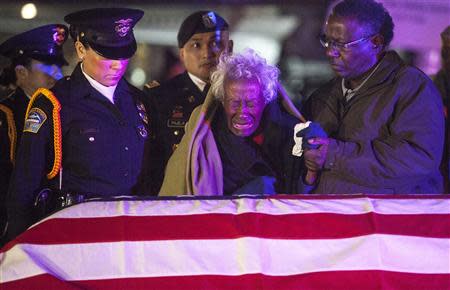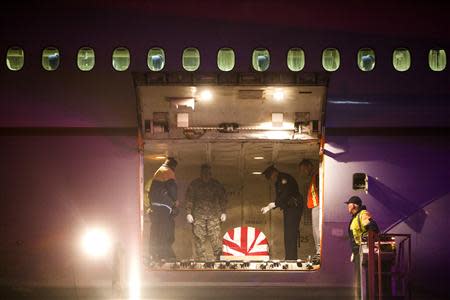U.S. war widow greets husband's coffin decades after death in captivity
LOS ANGELES (Reuters) - A 94-year-old U.S. war widow who never remarried after her husband died in captivity in the Korean War in 1951 had a tearful encounter with his flag-draped coffin on Friday in Los Angeles, when his recently identified remains arrived by plane. Local television footage showed Clara Gantt, dressed in a black jacket with a blanket draped over her head in the early morning chill, crying over the coffin of her late husband, Army Sergeant 1st Class Joseph Gantt. The ceremonial return occurred before dawn on the tarmac at Los Angeles International Airport, with members of an Army Honor Guard flanking Clara Gantt. She met her husband on a train carrying him and other troops in 1946 after he fought in World War Two, married him two years later and last saw him in 1950 when he went to war again. North Korea released Gantt's remains and those of at least half a dozen other U.S. servicemen in 2006. They were taken to an Army forensics lab in Hawaii for identification, which involves DNA testing and separating the bones of one soldier from another, said Bob Kurkjian, executive director of the Los Angeles chapter of the United Service Organizations. Over the last year and a half, the remains of three U.S. military members taken captive in the Korean War were returned to Southern California, but this was the only instance in which the spouse was still living, Kurkjian said. The war lasted from 1950 to 1953. After she greeted the coffin at the airport, Clara Gantt told reporters her late husband had always "looked out" for her and told her to remarry if he died, but she never did. The couple had no children together. "I always did love my husband," she said. "We loved each other and that made our marriage complete." Joseph Gantt, who was born in Maryland in 1924, served in the South Pacific during World War Two, according to the USO. In the Korean War, he was defending his unit's position near the village of Kunu'ri in December 1950 when he was captured. He died in captivity on March 27, 1951, the USO said. It remains unclear if he died of untreated wounds from battle or was mistreated in captivity in North Korea and perished as a result, Kurkjian said. "Everything's a shade of gray, especially that long ago," he said. Joseph Gantt will be buried at a cemetery in Inglewood, the working-class suburb of Los Angeles where his widow lives. He was posthumously awarded the Bronze Star Medal for his combat leadership on the day he was taken captive. (Reporting by Alex Dobuzinskis; Editing by Cynthia Johnston and Leslie Adler)




